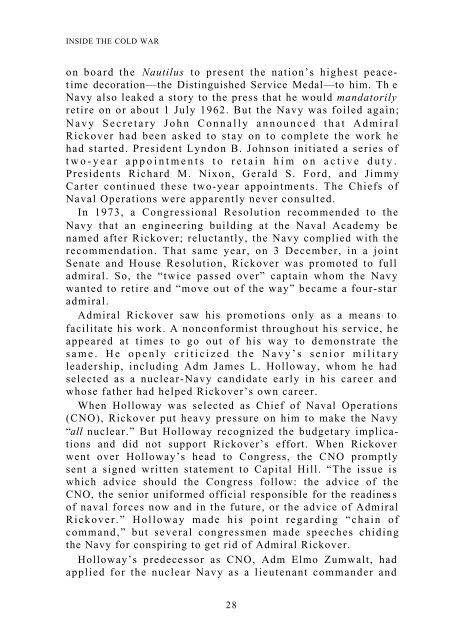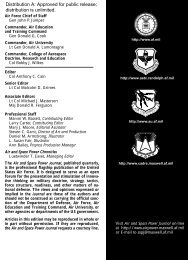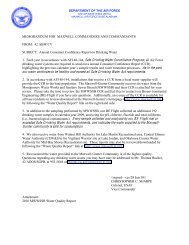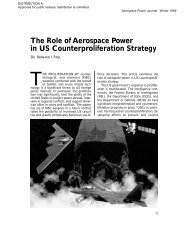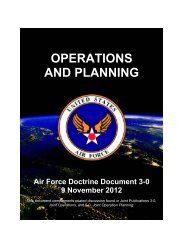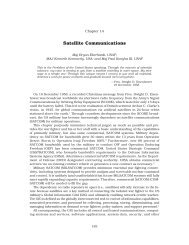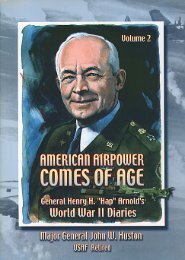Create successful ePaper yourself
Turn your PDF publications into a flip-book with our unique Google optimized e-Paper software.
INSIDE THE COLD WAR<br />
on board <strong>the</strong> Nautilus to present <strong>the</strong> nation’s highest peacet<br />
ime decoration—<strong>the</strong> Distinguished Service Medal—to him. Th e<br />
Navy also leaked a story to <strong>the</strong> press that he would mandatorily<br />
retire on or about 1 July 1962. But <strong>the</strong> Navy was foiled again;<br />
Navy Secretary John Connally announced that Admiral<br />
Rickover had been asked to stay on to complete <strong>the</strong> work he<br />
had started. President Lyndon B. Johnson initiated a series of<br />
two-year appointments to retain him on active duty.<br />
Presidents Richard M. Nixon, Gerald S. Ford, and Jimmy<br />
Carter continued <strong>the</strong>se two-year appointments. The Chiefs of<br />
Naval Operations were apparently never consulted.<br />
In 1973, a Congressional Resolution recommended to <strong>the</strong><br />
Navy that an engineering building at <strong>the</strong> Naval Academy be<br />
named after Rickover; reluctantly, <strong>the</strong> Navy complied with <strong>the</strong><br />
recommendation. That same year, on 3 December, in a joint<br />
Senate and House Resolution, Rickover was promoted to full<br />
admiral. So, <strong>the</strong> “twice passed over” captain whom <strong>the</strong> Navy<br />
wanted to retire and “move out of <strong>the</strong> way” became a four-star<br />
admiral.<br />
Admiral Rickover saw his promotions only as a means to<br />
facilitate his work. A nonconformist throughout his service, he<br />
appeared at times to go out of his way to demonstrate <strong>the</strong><br />
same. He openly criticized <strong>the</strong> Navy’s senior military<br />
leadership, including Adm James L. Holloway, whom he had<br />
selected as a nuclear-Navy candidate early in his career and<br />
whose fa<strong>the</strong>r had helped Rickover’s own career.<br />
When Holloway was selected as Chief of Naval Operations<br />
(CNO), Rickover put heavy pressure on him to make <strong>the</strong> Navy<br />
“all nuclear.” But Holloway recognized <strong>the</strong> budgetary implications<br />
and did not support Rickover’s effort. When Rickover<br />
went over Holloway’s head to Congress, <strong>the</strong> CNO promptly<br />
sent a signed written statement to Capital Hill. “The issue is<br />
which advice should <strong>the</strong> Congress follow: <strong>the</strong> advice of <strong>the</strong><br />
CNO, <strong>the</strong> senior uniformed official responsible for <strong>the</strong> readiness<br />
of naval forces now and in <strong>the</strong> future, or <strong>the</strong> advice of Admiral<br />
Rickover.” Holloway made his point regarding “chain of<br />
command,” but several congressmen made speeches chiding<br />
<strong>the</strong> Navy for conspiring to get rid of Admiral Rickover.<br />
Holloway’s predecessor as CNO, Adm Elmo Zumwalt, had<br />
applied for <strong>the</strong> nuclear Navy as a lieutenant commander and<br />
28


